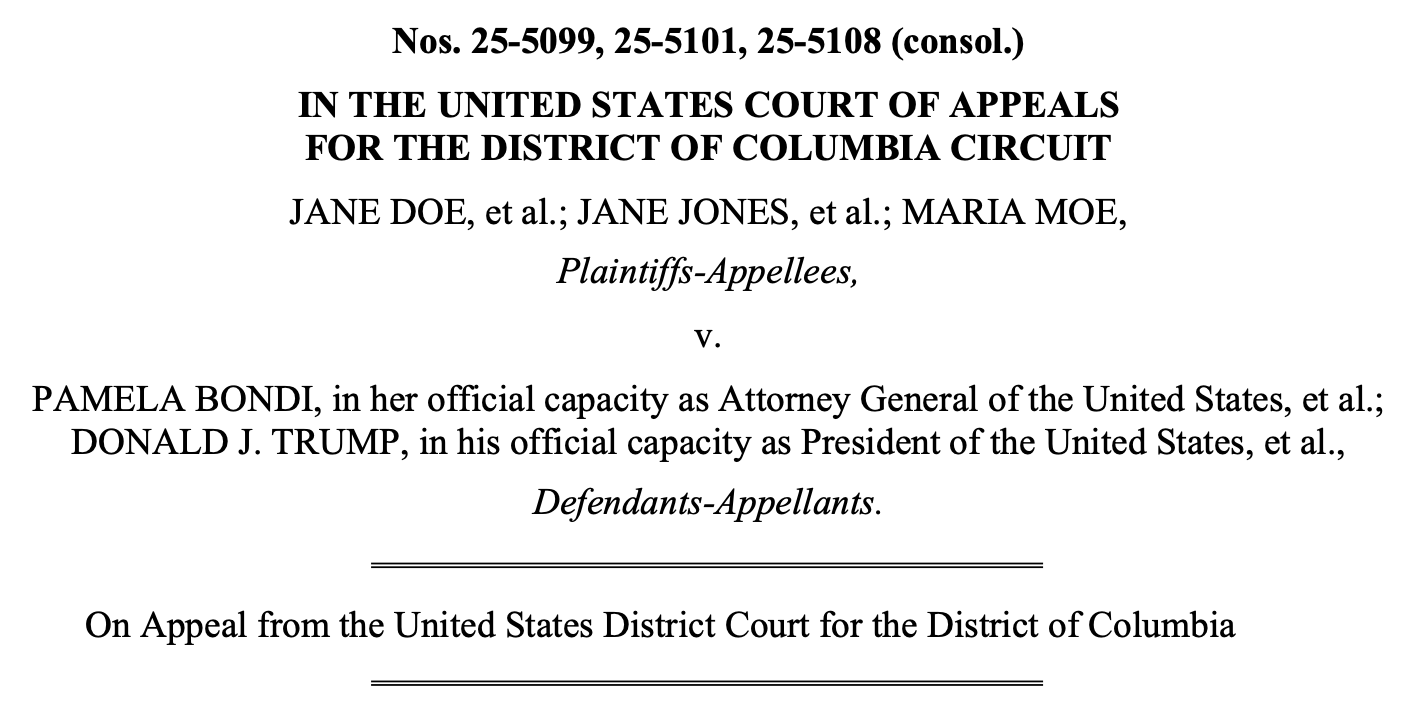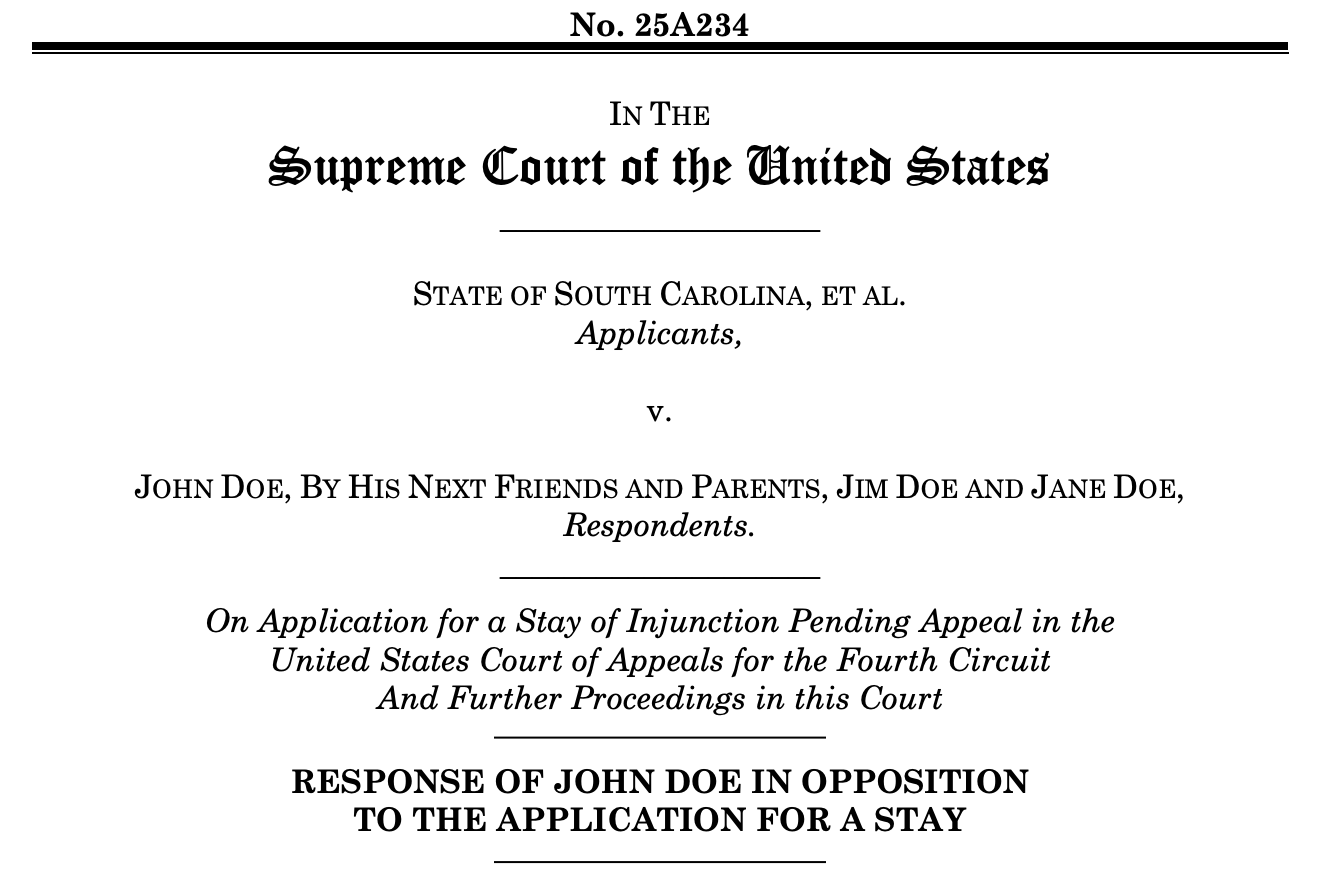Two cases, involving 20 people, show how dangerous the attack on trans people has gotten
DOJ wants to send 19 trans women to men's prisons. South Carolina wants to keep one trans boy out of the boys' restroom. And, for paid subscribers: Closing my tabs.
It has been clear for years that a directed attack on the right of transgender people to live their lives was underway, as has been covered at length at Law Dork, but two moments on Friday alone show just how dangerous this attack has gotten — and how hard, and carefully, lawyers defending trans people are pushing back.
On Friday morning, before a three-judge panel of the U.S. Court of Appeals for the D.C. Circuit, the Justice Department defended the Trump administration’s efforts to send 19 transgender women currently in women’s prisons to men’s prisons in implementing President Donald Trump’s anti-transgender order to that end.
In DOJ’s briefing in appeals of the injunctions issued by U.S. District Judge Royce Lamberth, a Reagan appointee, blocking the Bureau of Prisons transfer attempts, DOJ explicitly denied the existence of trans women.
DOJ’s Benjamin Hayes, who joined the department at some point in May and was not on the briefs, focused in his arguments before the appeals court panel on jurisdictional and exhaustion arguments — arguments that the case can’t be heard in the courts, at least not now.
The merits claims from Hayes — who referred to trans women as “trans-identifying men” and “trans-identifying males” — amounted to shell games. Among Hayes’ arguments was one asserting that the injunction couldn’t be upheld because there would need to be specific evidence that any specific prisons where the women could be transferred would be sufficiently harmful for the women. Another line of argument relied on, as Hayes put it, the fact that trans women — temporarily, allegedly — could be placed in solitary confinement for their protection after transfer if their safety was at risk.
The panel of Judges Sri Srinivasan and Cornelia Pillard, both Obama appointees, and Judge A. Raymond Randolph, a George H.W. Bush appointee, appeared likely to split along partisan lines in support of affirming the injunctions — although some of DOJ’s arguments prompted skepticism even from Randolph.
It’s important to see how clearly alarming this Trump administration effort is, as the plaintiffs briefed on appeal and Jennifer Levi from GLAD Law argued for them on Friday.
“This isn't about some abstract questions or philosophical debates,” Levi, the senior director of transgender and queer rights at GLAD Law, told the court. “This is about the constitutional limits on prison officials’ ability to ignore known and serious violence risks. These women will face the same brutal reality that any woman would face if forced to live in prison among men. They will be sexually assaulted, raped, and violently attacked. And we know this because it’s already happened to many of them.”
On Friday afternoon, other lawyers defending trans people took action on another front, defending an order from the U.S. Court of Appeals for the Fourth Circuit against a different effort — from South Carolina — to restrict trans people’s rights.
In that matter, pending on the U.S. Supreme Court shadow docket, South Carolina is fighting up to the Supreme Court to prevent one transgender student — a ninth-grade boy called John Doe in papers — from using the male restroom in his school. That is all the Fourth Circuit ordered, as the state itself had noted following its order.
But, in a blustering filing at the Supreme Court, the state claimed that it needs emergency relief from the justices. In opposing the injunction and asking the Supreme Court to stay it pending appeal, the lawyers for South Carolina — with Deputy Solicitor General Joseph Spate as counsel of record — wrote that The Fourth Circuit “reverted to its discredited outlier opinion in Grimm v. Gloucester County School Board, 972 F.3d 586 (4th Cir. 2020), cert. denied 141 S. Ct. 2878 (2021).“
Despite the state’s wording there, let’s be clear what Spate and his colleagues mean by that: The Fourth Circuit followed its precedent. For South Carolina before the Supreme Court, however, the Grimm case — about trans students rights in schools — is irrelevant after Supreme Court’s decision in U.S. v. Skrmetti — about bans on gender-affirming medical care for trans minors.
On Friday, however, the lawyers for the student responded at the Supreme Court, pointing out an inconvenient reality for South Carolina: “Only after the Fourth Circuit granted the injunction pending appeal did the government raise Skrmetti, but that was too little too late.“ In other words, for these purposes, the state waived that argument.
In addition to that problem, South Carolina’s brief continued with this mush of a sentence: “An emergency stay of the Fourth Circuit’s injunction is warranted not only because Grimm was wrongly decided and should (and may soon) be overturned, but because in the absence of this Court’s immediate intervention, the State, the school district, and its students are suffering actual, ongoing, material harms—all from a mandatory injunction that disrupts the status quo in a preliminary posture in a case where the Plaintiffs are unlikely ultimately to prevail.“
First of all, in case you are not a lawyer, the “should (and may soon) be overturned“ standard is not actually a part of the test for seeking a stay pending appeal.*
To that larger point, though, and as the lawyers for the student — with Public Justice’s Alexandra Brodsky as counsel of record — note in their response, ”No appellate court has yet decided what, if anything, Skrmetti might mean for these questions. Throughout its brief, the government says that Skrmetti abrogates Grimm and forecloses John’s arguments. In its upcoming merits brief, the government will have the chance to try to persuade the Fourth Circuit of that for the first time.”
Finally, it is notable that the lawyers for the student explained that all of the stays pointed to by the South Carolina lawyers as reasons to jump in here were the types of “universal injunctions” at issue in the CASA case this June. In contrast to those stays, the lawyers noted, “This case does not require intervention from this Court because the Fourth Circuit’s injunction is already tailored … to ensure the relief John needs while limiting the effect on the government.”
Despite that, South Carolina likely will file a reply soon and we will see if even that one trans student receiving the protection of Grimm is allowed to do so while these issues are considered.
If not, that would be a very bad sign indeed. For him, for those fighting bathroom bans, for the outcome of the two sports ban cases (Little v. Hecox and West Virginia v. B.P.J.) due to be heard by the justices this term, and for the equal protection rights of trans people more broadly.
While all of that was happening in the courts, I don’t want to ignore — even if nothing comes of it — the extremely alarming idea (although that’s giving it too much credit), per CNN’s Sept. 4 reporting, that the Justice Department is “looking at ways“ of banning transgender people from owning guns.
The morning after CNN’s report came out, the National Rifle Association posted a retort that represented its laying down of its marker:
The memes that followed notwithstanding, it is horrifying not only that this is being considered, but that DOJ officials wanted this consideration in the news.
As we move forward, it is essential to see how treacherous a moment this is for trans people — especially in light of the Trump administration’s ambitious animosity toward trans people and the Supreme Court Republican-appointee majority’s unwillingness, thus far, to stop anti-trans policies (or even admit that’s what they are) — and act accordingly to provide protection and protections for trans people wherever and however possible.
* = I deleted a series of brief sentences that followed about “mandatory injunctions” in light of a helpful comment. I still think South Carolina is incorrect, but in a different way than I suggested initially. It’s not important to my point, though, so best to just delete it to keep all more clear.
Closing my tabs
For those who don’t what this is, it’s my effort to give a little thank you to paid subscribers. “Closing my tabs” is, literally, me looking through the stories and cases open — the tabs open — on my computer and sharing with you all some of those I was unable to cover during the week but that I nonetheless want to let you know that I have on my radar. Oftentimes, they are issues that will eventually find their way back into the newsletter as a case discussed moves forward or something new happens that provides me with a reason to cover the story more in depth.
This Sunday, these are the tabs I am closing:







